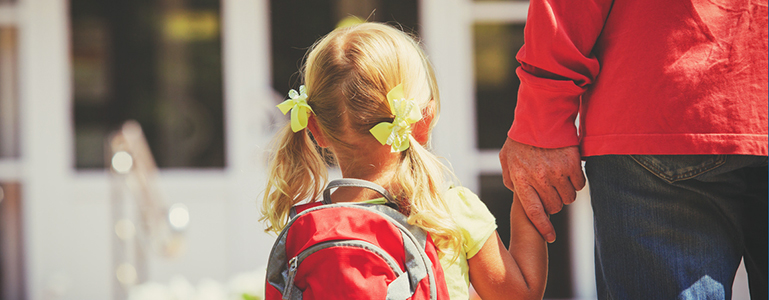It is that time of year when children everywhere are getting excited—and perhaps a little anxious—about the new school year starting. No one feels this more than Kindergarteners and their families. Starting elementary school is a big step for children and their parents.
Here are a few tips to help you relax and enjoy this important milestone.
- Work on getting into a school going routine at least a week before school starts. Summer is a time when we often become more flexible about bedtime and waking routines. Remember that a good night’s sleep and a healthy breakfast are two of the most important things your child needs to be prepared for a good day at school.
- Allow enough time in the morning so that you don’t have to feel rushed getting ready and out of the door. Try to prepare as much as possible the night before (such as lunches, backpacks, and clothing choices) so that there are fewer decisions to make in the morning and you are free to spend a few minutes calmly connecting with your child.
- Make sure you read all the communications that come from your school and your child’s teacher so that your child has everything he is expected to bring to school and knows what to expect when he gets there.
- Dress your child to play comfortably and safely and make sure she can manage the clothing herself. The same is true for her snack and lunch box containers. Make sure her food is packaged in a way that is easy for her to open herself. It is sometimes hard to ask for help at the beginning of Kindergarten and you want to make sure your child eats her snack and lunch so that she has energy for school.
- Check out the bathroom on the first day.
- Attend all social activities that are scheduled to help children and parents meet and begin to get to know each other. The very beginning of the school year is the best time to reach out and begin building the community that will enhance your child’s learning experience and your family’s life for the next six years and beyond.
- Get to school a little early each day and be there with your child to greet other families as they arrive. This is very helpful for children who are slow to warm or struggle with separation from you. It is always easier to be one of the first to arrive than to come into a party that is already under way.
- Don’t worry if your child comes home saying that he didn’t know something or didn’t get a turn to be line leader, etc. It is important for Kindergarteners to learn that it is okay to make mistakes and not know everything, and that your turn will come, you just need to wait for it.
- Don’t be surprised if you child is tired and cranky when she comes home for the first few weeks. It can take a little while to get used to the new situation and develop the stamina for all that learning.
- Try to keep your child’s schedule free after school and on weekends avoiding lots of lessons and structured events. But do allow time for your child to have playdates and flexibility to get together with new friends. Kindergarten is “playdate central,” and establishing relationships with friends outside the school setting will help your child socially at school as well.
Kindergarten is an amazing time of growth for children. There will be a wide range of maturity and academic skill level at the beginning of the year, but you will be amazed to see how they develop independence and how far they come over the course of the next nine months. Some will be reading now and others won’t even know how to write their name, but by June everyone will have the confidence to love the learning process and know that they are capable and ready to move on.
Enjoy the ride! The train picks up speed from here and before you know it your child will be off on his own!
Stephanie Agnew is the Assistant Director at Parents Place on the Peninsula. If you would like to learn more about how to help your child’s transition to Kindergarten or about Kindergarten Readiness, please book a consultation with Stephanie at 650-688-3046.



